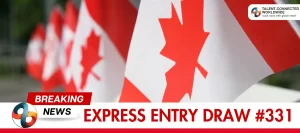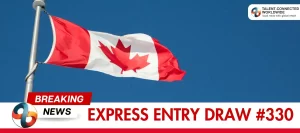
Getting a visa to Canada is an exciting step for many, whether you’re applying for a PR visa, work visa, or study visa. However, one crucial factor that affects all applicants is the Canada visa processing time. In this blog, we’ll cover everything you need to know about the visa process, the typical waiting periods, the reasons for possible delays, and of course, the current processing times.
1. Temporary Residence Visa Processing Time
Being a temporary resident in Canada means that you will only be in the country for a short period of time. This refers to instances where you traveled to the country to travel, study, or work for a temporary period.
NOTE: The data is updated weekly and the last time it was updated was on 03 Dec, 2024.
| Temporary Resident Visa Types | Processing Time |
|---|---|
| Visitor Visa (from India) or Tourist Visa | 114 Days |
| Visitor Visa (from inside Canada) | 18 Days |
| Extending your Visitor Visa | 126 Days |
| Super Visa (from India) | 129 Days |
| Study permit (from India) | 03 Weeks |
| Study permit (from inside Canada) | 13 Weeks |
| Extending your Study Permit | 158 Days |
| Work Permit (from India) | 19 weeks |
| Work Permit from inside Canada (for extension as well) | 171 Days |
| Seasonal Agricultural Worker Program (SAWP) | 08 Days |
| International Experience Canada | 06 Weeks |
| Electronic Travel Authorization (eTA) | 5 Minutes |
The processing time of a Canada visa application depends upon several factors, such as:
- Type of application
- Whether you submitted a complete application or not
- How quickly you respond to any requests from immigration authorities
- The country you are applying from
- If IRCC has a backlog of applications
- You took too much time in responding to IRCC’s request for additional information
These, and more, circumstances affect the processing time of an application. However, Immigration, Refugees and Citizenship Canada (IRCC) aims to process about 80% of applications within the standard processing time.
2. Canada PR Visa Application Processing Time
When you immigrate to Canada to live permanently, you can do so via one of the following programs. You can get Canada PR visa through any of these programs.
| PR Visa | Processing Time |
|---|---|
| Canadian Experience Class (CEC) | 5 Months |
| Federal Skilled Workers Program (FSWP) | 5 Months |
| Federal Skilled Trades Program (FSTP) | N/A |
| Provincial Nominee Program (PNP) – Through Express Entry Linked Stream – Through Non-Express Entry Linked Stream | – 6 Months – 13 Months |
| Atlantic Immigration Program (AIP) | 8 Months |
| Caregivers – Home Child Care Provider Pilot – Home Support Worker Pilot | – 21 Months – 18 Months |
| Self-Employed Persons | 48 Months |
| Quebec Business Class | 71 Months |
| Quebec Selected Skilled Workers | 11 Months |
| Start-Up Visa | 40 Months |
3. Family Sponsorship Application Processing Time
Through the Family Sponsorship program, a Canadian citizen or permanent residence holder can sponsor their spouse, common-law partner, adopted child, dependent child, parents, and grandparents to become a permanent resident of Canada and make them eligible to live, work, and study there. Thus, apply for a family visa and get to live in Canada with your family members.
| Sponsored Person | They are living in | You will live | Processing Time |
|---|---|---|---|
| Spouse or common-law partner | Inside Canada | In Quebec | 27 months |
| Outside Quebec | 12 months | ||
| Outside Canada | In Quebec | 36 months | |
| Outside Quebec | 10 months | ||
| Dependent Child (from India) | – | – | 09 months |
| Parents or grandparents | – | In Quebec | 48 months |
| – | Outside Quebec | 24 months |
Steps by step guide to Visa Processing
The visa application process can seem overwhelming, but breaking it down makes it more manageable. Here’s a step-by-step guide to help you understand the Canada visa processing time for different visa types, whether you’re going for permanent residency (PR), work, or study purposes.
Step 1: Choose the Right Visa Type
The first step is to determine the type of visa you need. The most common visas for Canada are:
- Permanent Resident (PR) Visa: For those who want to live permanently in Canada.
- Work Visa: For individuals wanting to work temporarily in Canada.
- Study Visa: For international students who wish to study in Canadian.
Each of these visas has different requirements and processing times, so choosing the correct one is crucial.
Step 2: Gather Required Documents
Regardless of the visa you apply for, you have to fill out proper documentation. The documents you will likely need include:
- Passport
- Proof of funds
- Offer letter
- Language proficiency test results
- Educational credentials
- Police clearance certificate
- Medical exam results
The accuracy and completeness of your documents significantly impact your Canada visa processing time.
Step 3: Submit Your Application
Once you’ve gathered all the necessary documents, it’s time to submit your application. The processing time begins once your application is submitted and all fees are paid.
Step 4: Biometrics and Medical Examination
After submission, you might be asked to provide biometrics and take a medical exam. You’ll receive a notification about when and where to complete these steps. Delays in scheduling biometrics or medical exams can extend your visa processing time.
Step 5: Wait for a Decision
Finally, you will have to wait for a decision. This can take anywhere from a few weeks to several months, depending on your visa type, application completeness, and other factors. Keep an eye on your email for any updates or requests for additional documents.
How to check your Canada visa application status?
Follow the steps below to check your visa application status:
- Visit IRCC’s official website
- On the front page, you’ll see “How to check your application status”, click on it
- Select the application type you applied for
- Sign in to your IRCC secure account and check the status!
Causes of Delay in Visas
Understanding the reasons for visa processing delays can help you avoid them or at least be prepared for a longer wait time.
1. Incomplete or Incorrect Documents
One of the most common reasons for visa delays is submitting incomplete or incorrect documentation. Even a small error can result in your application being rejected or refused. Make sure to double-check all information before submitting it.
2. High Application Volume
Canada is a popular destination for immigrants, workers, and students which can increase the Canada visa processing time.
3. Security Background Checks
In some cases, additional security or background checks may be required, which can slow down the process. This is especially common if you’ve lived in multiple countries.
4. Biometrics and Medical Delays
As mentioned earlier, the biometrics and medical exams are essential parts of the visa process. If there are delays in scheduling these, it will add more time to your visa processing time.






